Top10VPN is editorially independent. We may earn commissions if you buy a VPN via our links.
Are VPNs Legal?
Our Verdict
Yes, VPNs are completely legal in the USA, UK, Canada and in most other countries around the world. VPNs are only illegal if you live in Belarus, Iraq, North Korea or Turkmenistan. However, countries like China and Russia have laws that restrict VPN use in certain ways.
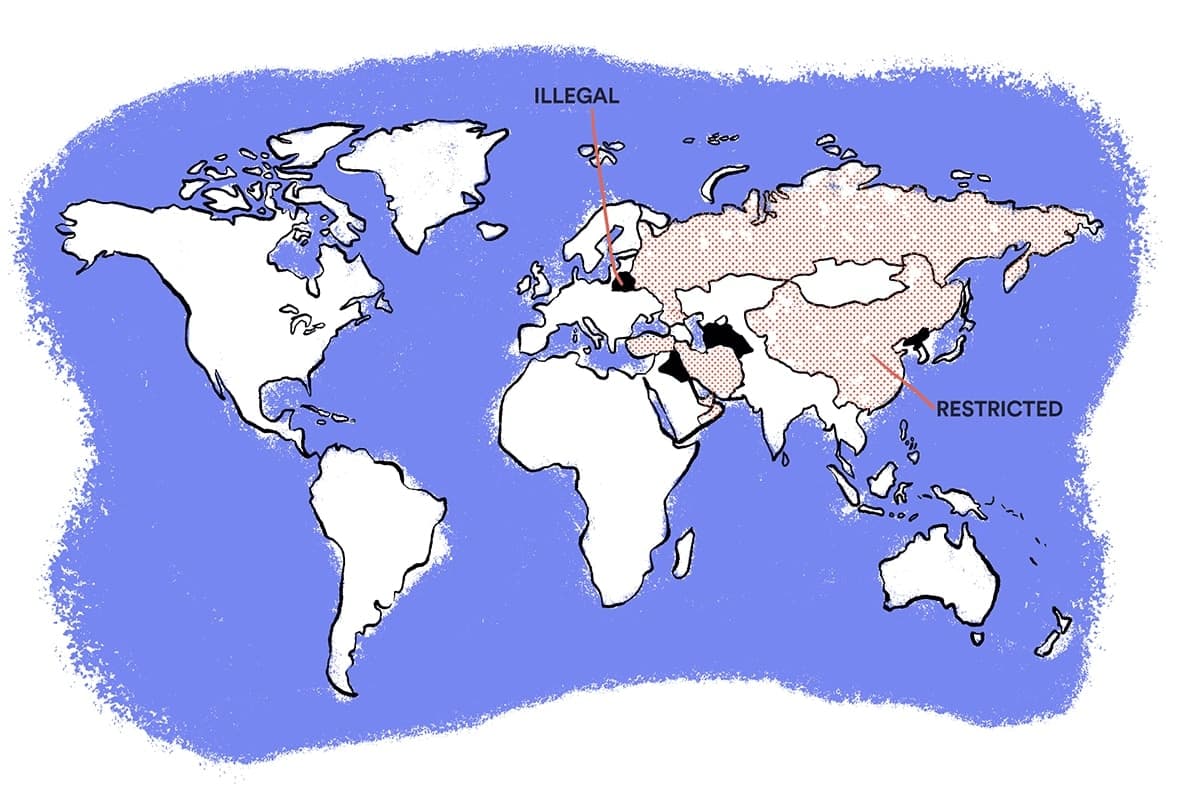
Virtual private networks (VPNs) are legitimate tools used to protect your privacy and security on the internet.
VPNs are legal to use in most countries, although they are illegal in four countries and restricted in a further six (seven counting Myanmar, where a ban appears to have been recently enacted).
We investigated the VPN laws of 190+ countries to understand where VPNs are legal. We found that:
- VPNs are legal to use in most countries, including the USA and UK.
- VPNs are illegal in Belarus, Iraq, North Korea, and Turkmenistan.
- VPN use is restricted in an additional seven countries, including China, Russia and, apparently, Myanmar.
- 16 countries allow VPN use but have noteworthy digital rights restrictions.
Despite the fact VPNs are legal in most countries, your activity while connected to a VPN is still subject to the laws of the country you’re located in. Ultimately, illegal activity remains illegal.
Moreover, it’s still possible for law enforcement to demand information stored by your VPN provider, unless you’re using a truly no-logs VPN service.
Keep in mind that using a VPN can also breach the terms of service of geo-restricted websites and applications you unblock from abroad.
Why Trust Us?
We’re fully independent and have been reviewing VPNs since 2016. Our advice is based on our own testing results and is unaffected by financial incentives. Learn who we are and how we test VPNs.
DISCLAIMER: While we’ve carried out thorough research to create this guide, we are not legal professionals. If you wish to clarify VPN legality, or the specific laws of any country, seek professional legal advice.
Where Are VPNs Legal?
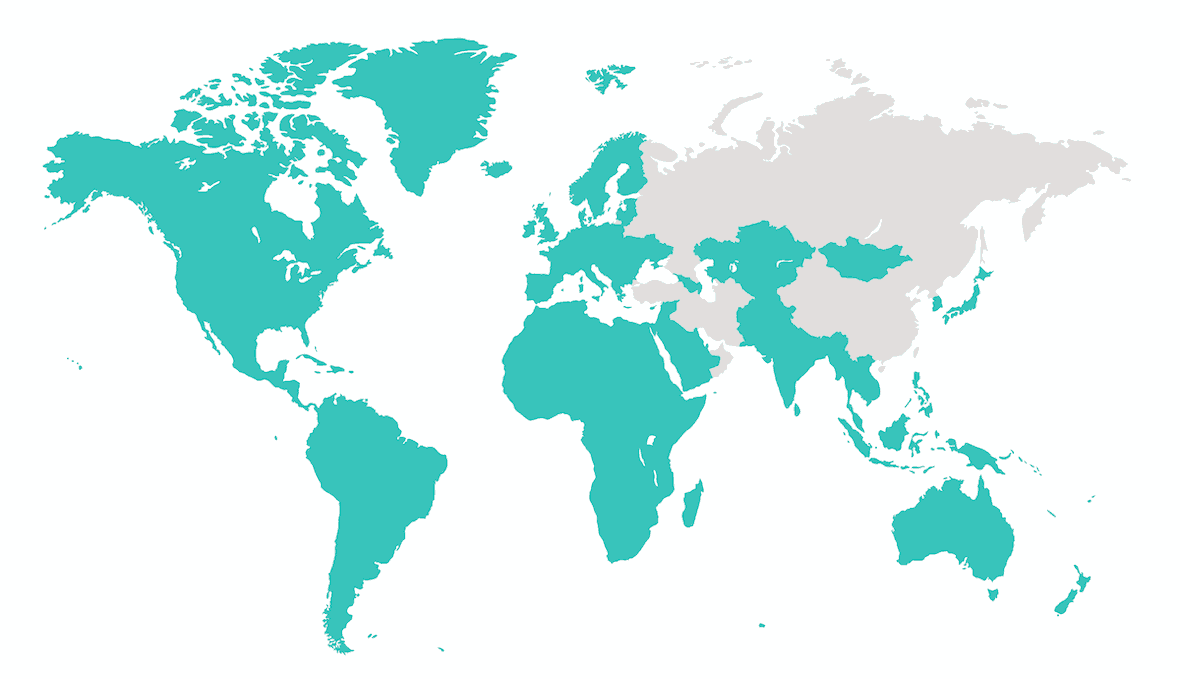
VPN services are legal in almost every country in the world, including the USA, UK, Canada, Australia, New Zealand, and most of Europe.
However, you are still subject to the laws of the country you’re located in – not the laws of the country you’ve routed your internet connection through.
In other words, illegal online activity is still illegal when you’re using a VPN, regardless of the server you’re connected to.
VPN services can still provide servers (and IP addresses) in countries where VPNs are illegal or restricted. ExpressVPN, for example, let’s users connect to VPN servers in Belarus and Turkey.
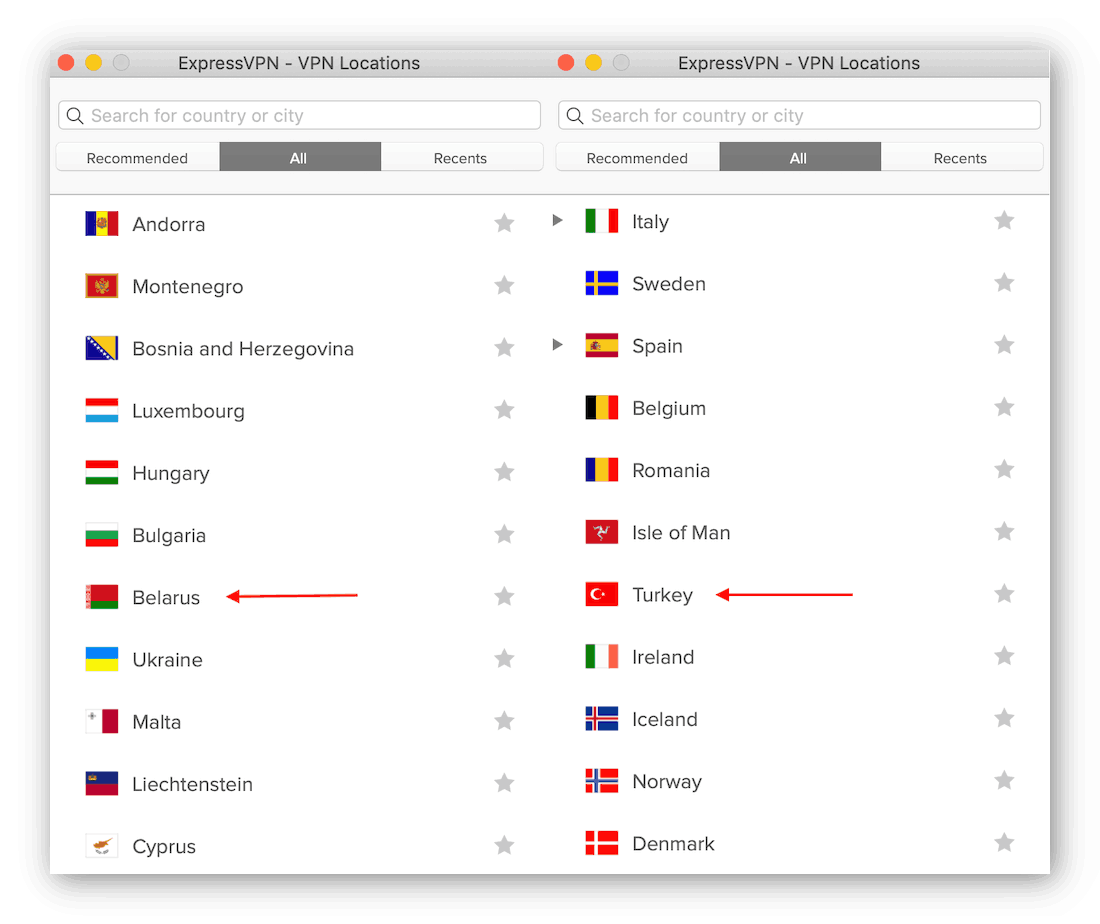
ExpressVPN offers servers in Belarus and Turkey, where VPNs are either illegal or restricted.
Using these VPN servers is perfectly legal as long as you’re not physically located in one of the 11 countries mentioned above.
This is because VPN services sometimes use virtual server locations. These servers are not actually located in the country they’re labeled with.
For instance, ExpressVPN’s Belarus and Turkey servers are both physically located in the Netherlands, where VPNs are legal.

ExpressVPN uses a number of virtual server locations.
Crucially, not all VPNs are created equal, and not all VPNs are safe.
Once you’ve determined that VPNs are legal in your country, you need to consider other factors that may impact your online safety.
These factors include your VPN service’s jurisdiction, logging policy, and security features. Your country’s torrenting laws and stance on digital rights is also important, even if VPN use is legal.
You should choose a verified no-logs VPN that’s been proven to not store any activity or connection logs.
Where Are VPNs Illegal or Restricted?
VPNs are illegal in Belarus, Iraq, North Korea and Turkmenistan. The use of VPN services is heavily restricted in China, Iran, Oman, Russia, Turkey, and the UAE.
Note that we are monitoring the developing situation in Myanmar, where there has been no official announcement from the government on the legal status VPNs despite the obvious crackdown on the software underway since the end of May 2024.
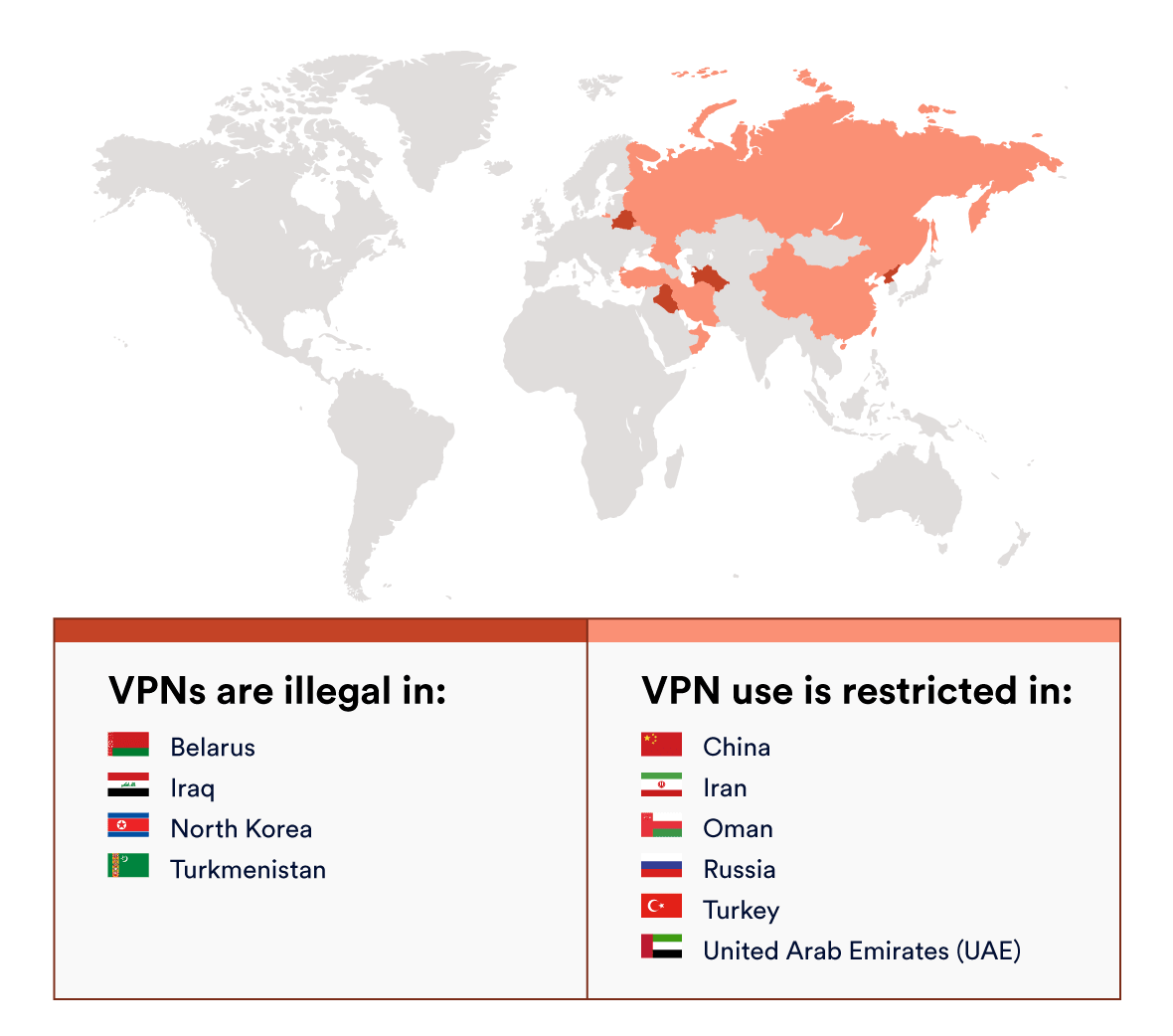
The countries in the table below are labeled according to the severity of their VPN laws and restrictions. ‘Extensive’ is the strictest level of restriction, followed by ‘moderate’ and ‘minor.’
| Country | VPN Law | Social Media Blocks | Censorship | Surveillance |
|---|---|---|---|---|
| Belarus | Illegal | Moderate | Extensive | Extensive |
| China | Restricted | Extensive | Extensive | Extensive |
| Iran | Restricted | Extensive | Extensive | Extensive |
| Iraq | Illegal | Moderate | Moderate | Minor |
| North Korea | Illegal | Extensive | Extensive | Extensive |
| Oman | Restricted | Minor | Extensive | Moderate |
| Russia | Restricted | Moderate | Extensive | Moderate |
| Turkey | Restricted | Moderate | Extensive | Extensive |
| Turkmenistan | Illegal | Extensive | Extensive | Extensive |
| UAE | Restricted | Moderate | Extensive | Moderate |
A table summarizing VPN laws in the 10 most restricted countries.
Here is a more detailed list of VPN laws in the 10 countries where VPNs are either illegal or restricted:
1. Belarus
VPNs are illegal in Belarus.
Belarus bans VPNs as it sees them as a method to undermine the law. In February 2015, the country’s Communications Ministry ruled against the use of anonymizers like VPNs.
Tor, which enables anonymous communications and access to the Dark Web, has also been blocked in Belarus since 2016.
It’s still unclear whether the government can actually contain the expanding VPN market. For the moment, there is an unspecified fine for anyone caught using a VPN in Belarus.
2. China
Only government-approved VPNs are legal in China.
VPNs are technically legal in China. However, all VPN services have to gain approval from the Chinese Communist Party (CCP) before they are allowed to operate in the country.
This often involves agreeing to conditions such as data logging, which makes the VPN pointless from a privacy perspective.
While there are suggestions that China might soon open up the VPN industry to foreign investment, using a VPN ‘without authorization’ can currently result in fines of up to 15,000 yuan (roughly $2,200).
Despite this, many people still wish to use a VPN in China. If this applies to you, read our article on the best VPNs for China, since most VPN apps will not work.

China, 2010. Google closes its site in the country following disputes over censorship with the government. Credit: Wenn Rights/Alamy
3. Iran
Only government-approved VPNs are legal in Iran.
Iran has been blocking unsanctioned VPNs since 2013, while state-sanctioned VPNs are monitored heavily.
The penalty for using a VPN that isn’t sanctioned by the Iranian government is up to one year in prison.
4. Iraq
VPNs are illegal in Iraq.
VPNs have been banned in Iraq since 2014. The government claims this ban is to keep terrorist organizations from influencing the public via social media.
Iraqi government officials still use VPNs, despite there officially being ‘no exceptions’ to the rule.
5. North Korea
VPNs are illegal in North Korea.
North Koreans aren’t allowed to access foreign media, so it’s not surprising that VPNs are illegal.
The penalty for VPN use is unknown as North Korea is so secretive.
The country’s internet is also heavily censored, and foreign diplomats are prohibited from using it.
6. Oman
Only VPNs permitted by the Sultanate are legal in Oman.
Since 2010, Oman has banned all VPNs except those permitted by the Sultanate. These exceptions only apply to corporate VPN services, which have to apply for authorization.
All approved corporate VPN providers must keep web usage logs.
Personal VPN use is illegal in Oman to prevent citizens from bypassing internet restrictions. Attempting to circumvent these laws is punishable with a fine of $1,300.
7. Russia
Only government-approved VPNs are legal in Russia.
Russia has banned unapproved VPNs to prevent access to ‘unlawful content’. Russian ISPs enforce the ban by blocking websites that offer VPN services, however some are still accessible.
In September 2021, Roskomnadzor banned ExpressVPN, NordVPN, IPVanish VPN, Hola VPN, KeepSolid VPN Unlimited and Speedify VPN.
In 2023, multiple other VPN services were blocked and the Russian censorship agency temporarily disrupted several popular VPN protocols, including OpenVPN and Wireguard.
In recent months, VPN apps have come under attack by several leading politicians and multiple new laws have been introduced that may limit access to VPNs even further.
The punishment for using an unapproved VPN in Russia is 300,000 RUB ($5,100) for the user and 700,000 RUB ($12,000) for the service provider.
If you’re traveling to Russia and need to use a VPN, we recommend you see our recommendations for the best VPNs for Russia.
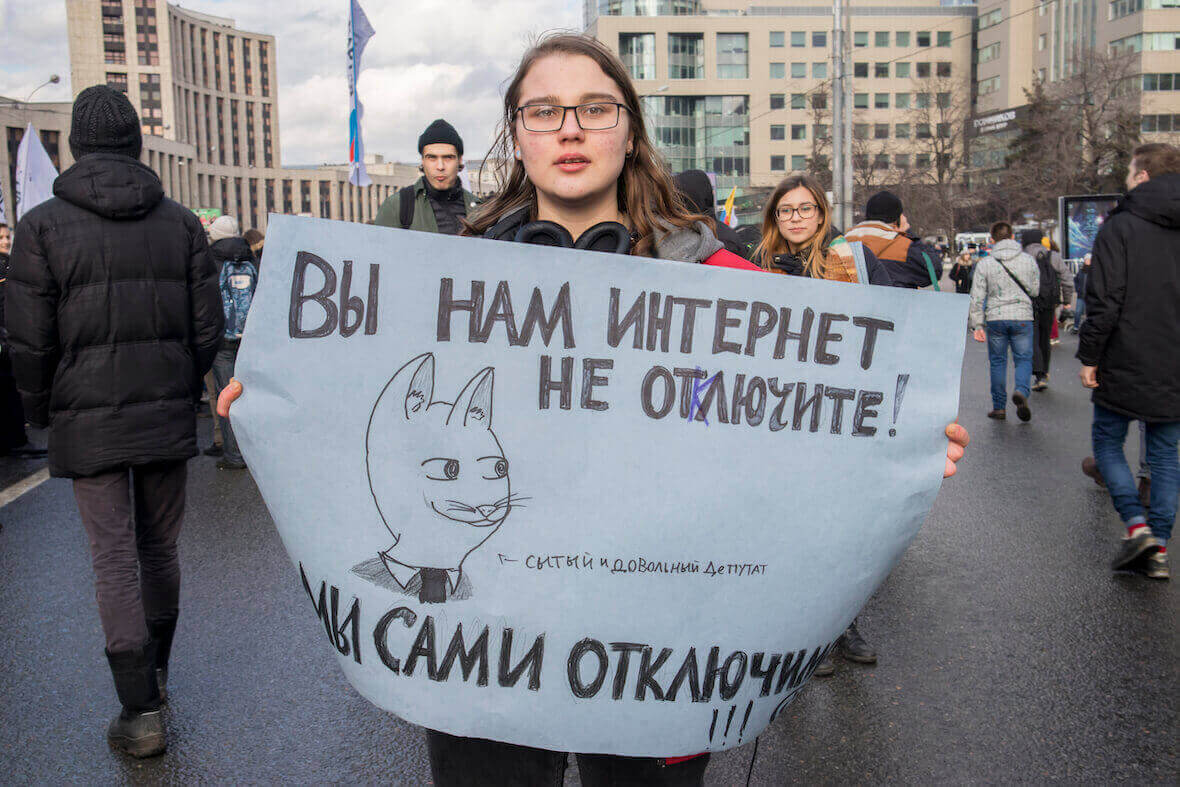
Moscow, Russia. March 10th, 2019. A protester marches against increasing internet censorship. Credit: Elena Rostunova
8. Turkey
VPNs are legal in Turkey, but their use is restricted.
The Turkish government have been restricting VPN use since 2016, justifying the crackdown as necessary to protect national security and to ‘fight terrorism’.
In 2016, 10 VPN providers and Tor were blocked in the country. While in 2023, another 16 apps were banned by the Information and Communication Technologies Authority (BTK).
As watchdogs in Turkey have noted, it is often people critical of the government who end up being penalized and censored by authorities.
If you need a VPN before visiting, see which VPNs still work in Turkey.
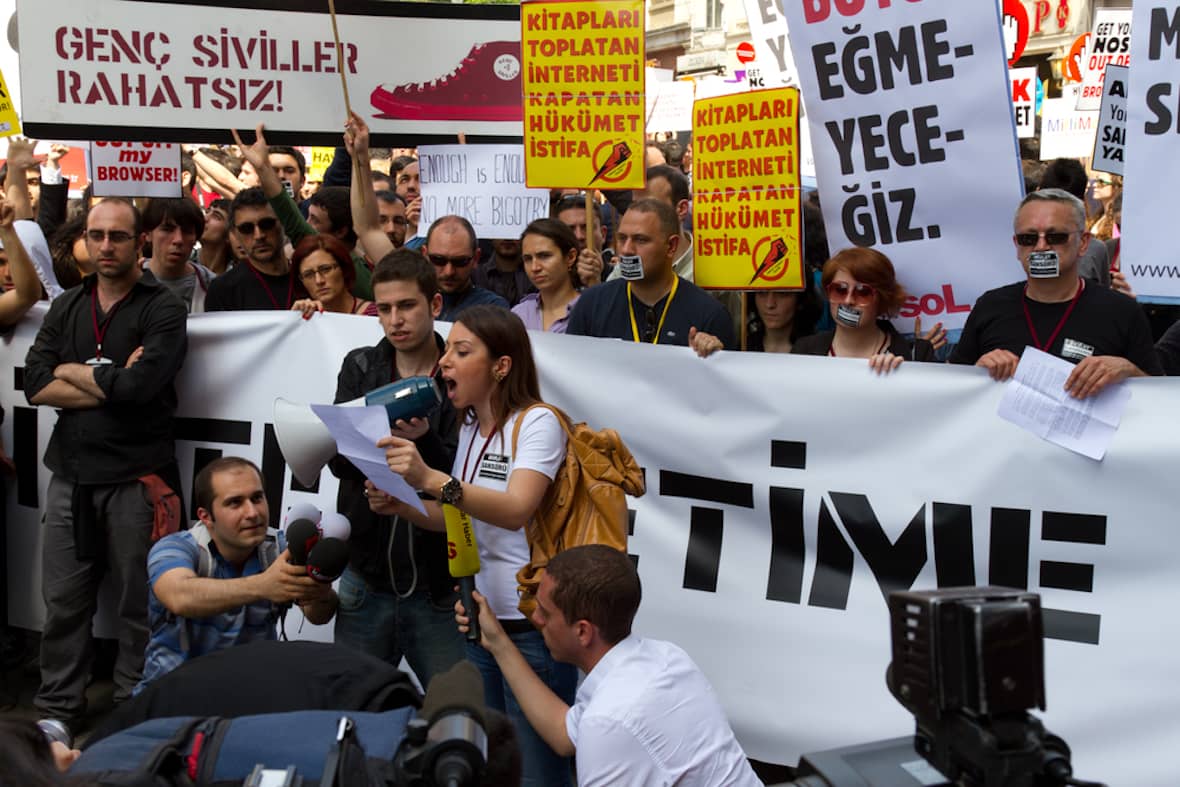
Istanbul, Turkey. May 15th, 2011. Citizens protest against the government’s decision to introduce content filtering. Credit: Evren Kalinbacak
9. Turkmenistan
VPNs are illegal in Turkmenistan.
Turkmenistan banned VPNs in 2015 to censor foreign media. All proxies and VPN services are detected and blocked by Turkmenistan’s state-run ISP, Turkmenet.
Turkmenistan’s internet is deliberately overpriced to discourage people from using it. A monthly subscription costs $213.00 for 8Kbps — more than the country’s average monthly salary.
Using a VPN in Turkmenistan can bring an unspecified fine and an intimidating summons from the Ministry of National Security to have a “preventative conversation”.
10. United Arab Emirates (UAE)
Only government-approved VPNs are legal in the UAE.
The United Arab Emirates only permits the use of government-approved VPNs. This was enforced in 2012, during the Arab Spring.
Banning unapproved VPNs was done to discourage the use of VoIP services like Skype, WhatsApp, and Facebook.
The blocking of VoIP services in the UAE was for both economic and political reasons. It aims to encourage local residents to pay the (expensive) subscription fee for local telecom services, Etislat and Du.
Corporate entities, however, are able to use VPNs unrestricted.
If a VPN is used to commit a crime in the UAE, the user could face prison or a fine of between AED 150,000 (roughly $41,000) and AED 500,000 (roughly $136,000).
If you’re in need of a VPN before traveling to the UAE, see our list of recommended VPNs for the UAE.
Kashmir, India
While using a VPN is technically legal throughout all of India, there have been instances of VPN ‘blocking’ in the northern region of Kashmir and Jammu.
In August 2019, the Indian government began restricting internet use in Kashmir. It began with a complete communications blackout, which was followed by a “whitelist” of a small number of websites. Many residents turned to VPNs to help bypass these website blocks
After a video of separatist leader Syed Ali Shah Geelani emerged on social media in February 2020, police have begun taking action against VPN users.
Anyone suspected of using a VPN to spread secessionist ideals is being called in for questioning. There are reported cases of soldiers forcefully searching people’s phones for VPN apps. If found, they have deleted the app, confiscated the phone, or even beat the owner.
According to Indian law, it is still perfectly legal to use a VPN in Kashmir. Most ‘offenders’ are being booked for “misuse of social media” rather than for using a VPN.
With that said, we would advise extreme caution when it comes to using a VPN in Kashmir. It is not worth taking the risk whilst authorities continue to work on the assumption that anyone using a VPN is committing a crime.
Pakistan
The Pakistan Telecommunications Authority (PTA) originally set a deadline of June 30th 2020 for citizens to register their VPN connections with the government. After this date, any unregistered VPNs were supposed to be blocked.
This deadline was then postponed until 31st July 2020, and then again to 30th September, “in order to facilitate businesses & the public”.
According to the PTA, the law is in line with regulations which state that “any mode of communication that becomes hidden or encrypted” requires appropriate registration.
It is unclear what the consequences of using an unregistered VPN in Pakistan will be. However, the PTA has stated in a press release that “action will be taken only against unauthorized VPNs for terminating illegal traffic which causes loss to the national exchequer.”
Pakistani authorities have previously blocked popular websites such as YouTube, Facebook, and Wikipedia. Connections to platforms such as Twitter, Periscope, and Zoom have also been throttled in the past.
It remains to be seen how strictly commercial VPN users will be targeted after the ruling is enforced, but we advise caution. We’ll be monitoring the situation and will update this page when there are developments.
UPDATE: As of writing, there has been little word from the PTA regarding the VPN ban. Currently, it seems to apply only to businesses and not to individuals.


